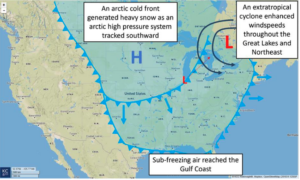The winter storm that brought frigid arctic air south to the Gulf of Mexico will cause $5.4 billion in insured losses in 42 states, Karen Clark & Co. projected on Thursday.
The storm, known as Winter Storm Elliott, brought sub-freezing temperatures across the Southeast and high winds that caused power outages that left tens of thousands of homes and businesses without electricity. Historic blizzard conditions lasted more than 36 hours in Buffalo, New York, KCC said.
 The weather system, known as a “bomb cyclone,” brought winds with speeds up to 40mph to the Great Lakes region on Dec. 24. The wind interacted with warm water in the Great Lakes to fuel lake effect snow bands, KCC said. Snowfall would have been even more intense if the storm had struck after the lakes froze over.
The weather system, known as a “bomb cyclone,” brought winds with speeds up to 40mph to the Great Lakes region on Dec. 24. The wind interacted with warm water in the Great Lakes to fuel lake effect snow bands, KCC said. Snowfall would have been even more intense if the storm had struck after the lakes froze over.
Temperatures plunged to below 20 degrees Fahrenheit across must of the Eastern United States.
KCC said Texas, Georgia, Tennessee, North Carolina and New York suffered the most significant damage. The freezing temperatures caused “infrastructure disruptions” and burst pipes in homes and commercial and industrial properties. Commercial losses are projected to account for 50% of the insured losses, KCC said.
The report says Winter Storm Elliott differed from a February 2021 arctic air outbreak, known was Winter Storm Uri. Swiss Re estimate last year’s storm caused $15 billion in insured losses.
KCC said Uri was primarily an arctic air outbreak with a few weak low-pressure systems, none of which produced prolonged blizzard conditions. Other comparative historic arctic air outbreaks included January 2011, December 1989, and December 1983.
The report says the closest comparable event to Elliott is an extratropical cyclone that struck in December 1989, although that storm was confined to the Southeast coast and did not impact as large a region of the US as Elliott did.
Was this article valuable?
Here are more articles you may enjoy.

 Portugal Rolls Out $2.9 Billion Aid as Deadly Flooding Spreads
Portugal Rolls Out $2.9 Billion Aid as Deadly Flooding Spreads  China Bans Hidden Car Door Handles in World-First Safety Policy
China Bans Hidden Car Door Handles in World-First Safety Policy  Cape Cod Faces Highest Snow Risk as New Coastal Storm Forms
Cape Cod Faces Highest Snow Risk as New Coastal Storm Forms  Uber Jury Awards $8.5 Million Damages in Sexual Assault Case
Uber Jury Awards $8.5 Million Damages in Sexual Assault Case 